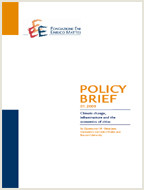Winter-break in Cancún: will the EU carry its leadership?
This policy brief will analyze Europe’s role in shaping climate change negotiations, the
challenges faced by EU leadership after the 15th Conference of the Parties (COP 15), and whether it is still fundamental in order to reach an international agreement. Since the 1990s climate change governance has increasingly become part of broader European foreign policy, and has pursued fundamental objectives both at the international (global leader) and national (European integration) levels. In order to substantiate its role, the EU has been leading-by-doing, connecting what was going on at home with what was being advocated at the international level, adopting proactive climate and energy policies. COP 15 in Copenhagen represented a step backward in EU leadership, which was heavily challenged on many fronts. The EU played a marginal role in the Copenhagen Accord definition watching new actors (the U.S., BASIC and ALBA countries) become the protagonists of its elaboration. The EU’s loss of soft power pointed out how much its leadership suffered from a lack of unified representation at the negotiations level, mainly caused by divergences in implementing domestic climate policy. While the loss of European leadership should not be necessarily considered as permanent, this policy brief will question whether the EU’s leading role will still be necessary in the future. The Copenhagen Accord has highlighted the appeal of having a portfolio of non-binding domestic commitments instead of an international binding agreement with targets and timetables. Will Europe be able to cope with this new possible option?

